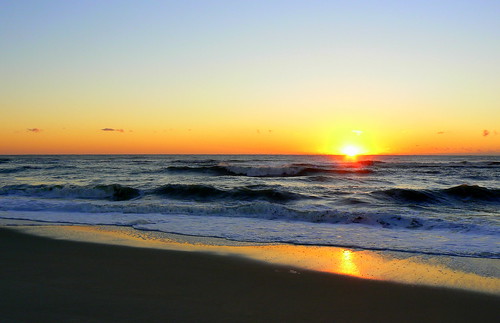海洋覆蓋地球3/4的表面,含有地球97%的水,佔全球生物棲息容積的99%。但是過度開發、非法捕魚、非永續水產養殖、海洋汙染、棲地破壞、外來種、氣候變遷以及海洋酸化種種人類活動,正在對全球海洋造成壓力和破壞。
6月8日是世界海洋日,今年是聯合國海洋法公約生效第20周年。海洋公約法是所有海洋活動的法律依歸,也是全球海洋永續利用的關鍵。
海洋是國家經濟命脈 大堡礁恐列為瀕危遺產
人類所呼吸的大部分氧氣產自海洋,吐出的二氧化碳有30%被海洋吸收,因此海洋也有緩解全球暖化效應的功用。此外,海洋也是國際貿易的基石,對於依賴旅遊和漁業的國家來說更是經濟命脈。
澳洲昆士蘭沿岸將興建5座超大型港口,大多位在全球最大珊瑚礁和聯合國世界遺產大堡礁附近,澳洲保育團體為此感到非常憂心。
聯合國世界遺產委員會自2011年起持續對澳洲大堡礁的管理措施提出關切。接下來一年內,世界遺產委員會將決定是否將大堡礁的加入《瀕危世界遺產名錄》。
美國海星疾病蔓延 國務卿凱瑞籲政治人物保育海洋
根據官方統計,海洋涵養了近200,000種已知物種,但實際數字可能為上百萬。全球超過30億人依賴海洋和沿岸生物多樣性生活。
北美太平洋沿岸最近更出現新的海洋生物多樣性威脅。
前兩周,奧勒岡州沿岸爆發規模空前的海星消耗性疾病,研究者認為很可能危及整個紫色赭石海星族群。而在此波爆發前,奧勒岡州沿岸原本是整個西岸唯一倖免於海星消耗性疾病的地區。
美國國務卿凱瑞呼籲美國政治家加入保育海洋行動,也歡迎草根環團持續督促。
保護海洋獵食者 多國禁鯊魚商業捕撈
一些國家則正在努力保育海洋物種。
英屬維京群島5月22日加入宏都拉斯和巴哈馬的行列,在其海域設立永久鯊魚保育區。宏都拉斯和巴哈馬於2011年設立鯊魚保育區。
英國海外領土內閣禁止其30,933平方英里的經濟海域內所有鯊魚和魟魚物種的商業捕撈活動,也禁止境內買賣和貿易鯊魚產品。許多瀕危和近危鯊魚物種,包括遠洋白鰭鯊、雙髻鯊、虎鯊和加勒比礁鯊,都會游經英屬維京群島海域。
全世界每年共有約1億隻鯊魚死於商業捕撈。因此,超過半數的鯊魚和其近緣物種被列入世界自然保育聯盟紅色名錄的瀕危或近危。
Oceans cover three quarters of the Earth’s surface, contain 97 percent of the Earth’s water, and represent 99 percent of the living space on the planet by volume. But human pressures, such as overexploitation, illegal fishing, unsustainable aquaculture, marine pollution, habitat destruction, alien species, climate change and ocean acidification are taking their toll.
June 8, World Oceans Day, this year marks the 20th anniversary of the day the United Nations Convention on the Law of the Sea entered into force. This treaty provides a comprehensive legal framework for all ocean activities and is critical to the sustainable use of the world’s seas and oceans.
Sunrise over the Atlantic shore of Assateague Island, a barrier island off the eastern coast of Maryland and Virginia, USA (Photo by Grace Alone)
But there are many threats to the oceans of the world.
Australian conservationists are alarmed because five mega ports will be allowed along the Queensland coast, mainly in areas near the Great Barrier Reef, the world’s largest reef and a UN World Heritage Site.
The UN’s World Heritage Committee has continued to express serious concern about Australia’s management of the Great Barrier Reef since 2011.
There is a strong and disturbing possibility that, within the next 12 months, the World Heritage Committee will decide to downgrade the Great Barrier Reef’s status to an “In Danger” status.
Oceans generate most of the oxygen humans breathe. They absorb about 30 percent of carbon dioxide produced by humans, buffering the impacts of global warming. And oceans serve as the backbone of international trade, and are important economically for countries that rely on tourism and fishing.
But human pressures, such as overexploitation, illegal, unreported and unregulated fishing, destructive fishing, unsustainable aquaculture practices, marine pollution, habitat destruction, alien species, climate change and ocean acidification are taking their toll on the world’s oceans and seas.
Oceans contain nearly 200,000 identified species, but actual numbers may lie in the millions. More than three billion people depend on marine and coastal biodiversity for their livelihoods.
Along the Pacific coast of North America, there is a new threat to marine biodiversity.
Just in the past two weeks, the incidence of sea star wasting syndrome has exploded along the Oregon Coast and created an epidemic of historic magnitude, one that threatens to decimate the entire population of purple ochre sea stars, researchers say.
Before this outbreak, Oregon had been the only part of the West Coast that had been spared this devastating disease.
U.S. Secretary of State John Kerry urged U.s. politicians to protect the oceans and welcomed the pressure from grassroots environmentalists that might motivate them to do so.
Some countries are acting to conserve marine species.
The British Virgin Islands moved on May 22 to establish a permanent shark sanctuary in its waters, joining The Bahamas and Honduras, which declared shark sanctuaries in 2011.
The designation by the cabinet of the British overseas territory prohibits commercial fishing of all shark and rays species throughout the full exclusive economic zone – an area of 30,933 square miles. The designation also bans the sale and trade of sharks and shark products within the territory. Many threatened or near-threatened shark species, including the oceanic whitetip, scalloped hammerhead, tiger, and Caribbean reef sharks, swim in the waters off the British Virgin Islands.
Worldwide, an estimated 100 million sharks are killed each year in commercial fisheries. As a result, the International Union for Conservation of Nature’s Red List of Threatened Species says that more than half of all sharks and sharklike species are threatened or near-threatened with extinction.
※ 全文及圖片詳見:ENS






